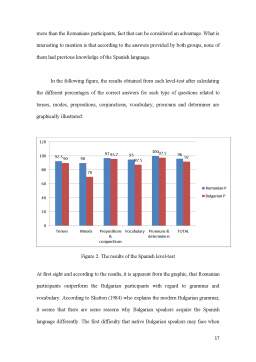Cuprins
- 1. Introduction 3-4
- 2. Theoretical Background 4-10
- 2.1 Main theories of SLA
- 2.1.1 Behaviorism 5-6
- 2.1.2 Acculturation 6-7
- 2.1.3 Interaction, input and output hypotheses 7
- 2.2 Non-language variables in SLA
- 2.2.1 Age 8 - 9
- 2.2.2 Intelligence and aptitude 9-10
- 2.2.3 Aptitude and motivation 10
- 3. Method 10-13
- 3.1 Participants 10-11
- 3.2 Data collection instrument 11
- 3.3 Procedure 12-13
- 4. Presentation and discussion of results 13-18
- 5. Conclusion 19
- References 20-21
- Appendix A 22-26
Extras din proiect
1. Introduction
Over the last 40 years SLA has become an interdisciplinary field where the study of (second) language acquisition has been approached from different linguistic perspectives such as sociology, psychology, education, sociolinguistics, conversational analysis. The field of second language learning seems to be old and new at the same time, that is, it is old in the sense that many scholars have been interested in the nature of foreign language learning, but it is also new in the sense that this field in particular, only goes back about 40 years (Gass and Selinker, 2008: 1-2).
In the recent past years, SLA research has focused its attention on the way learners build up their vocabulary (Gass and Selinker 2001), the important role that motivation plays in SLA (Gardner 2010) and how interaction influences SLA (Ellis 1994). However, although studies on the effects of non-language variables (Ellis 1994; Gardner 2010; Gass and Selinker 2001) have shown that they play a crucial role in the acquisition of a second language, the nationalities variable has not received the proper attention.
The purpose of the present study is to carry out a contrastive analysis of the way in which two groups of European immigrants, that is, Romanic speakers - especially native speakers of Romanian and Slavic speakers - especially native speakers of Bulgarian living in Spain - Madrid, acquire the official language, in this case the Spanish language. In other words, it tries to demonstrate to what extent native speakers of Romanian speak better the Spanish language compared to native speakers of Bulgarian.
The main aim of this paper is to examine whether there are differences in the way Romanian and Bulgarian adult immigrants learn the Spanish language. The reason for selecting these particular foreign groups is that according to the Concejalía de Asuntos Sociales de la Comunidad de Madrid (June 2013), the Romanian community is the largest community (22,40%) of foreign people living in Madrid followed by the Bulgarian community (3,13%).
The hypothesis of this research paper is that native Romanian speakers acquire the Spanish language better than the native Bulgarian speakers and the experiments reported in this paper show that Romanian speakers make fewer mistakes regarding grammar and vocabulary than Bulgarian speakers. In sum, the present study is expected to provide a way of understanding why native Romanian speakers are better learners of the Spanish language than native Bulgarian speakers.
This study is organized as follows: after the introduction section, the theoretical background offers a description of de main theories of SLA including the main non-language variables that affect and influence SLA. A following section focuses on the methodology that was carried out for this research. Afterwards, a presentation and discussion of results is given, concluding with the last section which summarizes the study and draws some preliminary conclusions.
Preview document
Conținut arhivă zip
- The Role of Non-Language Variables in Foreign Language Learning.docx




































